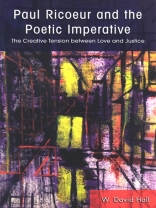This book addresses the thought of Paul Ricoeur (1913–2005), paying particular attention to the creative tension between love and justice as principle themes in his work. Dealing with these issues chiefly in his writings on religion, Ricoeur explored the tension between the biblical ideals of the golden rule—the religious formulation of a principle of justice—and the love command. Author W. David Hall shows how these ideals continually speak to each other in Ricoeur’s work, how they operate creatively on each other, and how each serves as a corrective to the perversions of the other. Hall maintains that although issues of love and justice became prominent comparatively late in Ricoeur’s corpus, they provide a sustained trajectory throughout his work and are an important interpretive key for understanding Ricoeur’s intellectual project as a whole.
Spis treści
Acknowledgments
1. Introduction
Situated Reading
Interpretational Structure
2. Agency: The Structures of Selfhood
The Structure of Agency
Capability: The Voluntary and the Involuntary
Identity:
Idem and
Ipse
Attestation: Acting and Suffering Selves
3. Meaning: The Narrative Configuration of Existence
The Configuration of Meaning
Understanding: Active Receptivity
Possibility: Actuality and Potentiality
Affirmation: A Hermeneutics of Meaningful Existence
4. Practice: Practical Experience and Moral Concern
Practical Experience
Responsibility: Imputation and Solicitude
Ethics: Power and Violence
Witness: Conviction and Fidelity
5. Conscience: Conviction and Fidelity in Theological Perspective
The Testimony of Conscience
Basic Structures: The Logic of Equivalence and the Logic of Superabundance
Configuration: The Golden Rule and the Love Command
Experience: Autonomy and Theonomy
6. The Economy of the Gift and the Poetic Imperative
The Economy of the Gift
Love and Justice
The Poetic Imperative
Notes
Bibliography
Index
O autorze
W. David Hall is Assistant Professor of Religion and Philosophy at Centre College and coeditor (with John Wall and William Schweiker) of
Paul Ricoeur and Contemporary Moral Thought.







![Pokrywa Brian Schrag & Julisa Rowe: Community Arts for God's Purposes [Chinese] 貼近神心意的社群藝術 Pokrywa Brian Schrag & Julisa Rowe: Community Arts for God's Purposes [Chinese] 貼近神心意的社群藝術](https://static.worldofdigitals.com/thumb_webp/740/9781645083740.webp)




